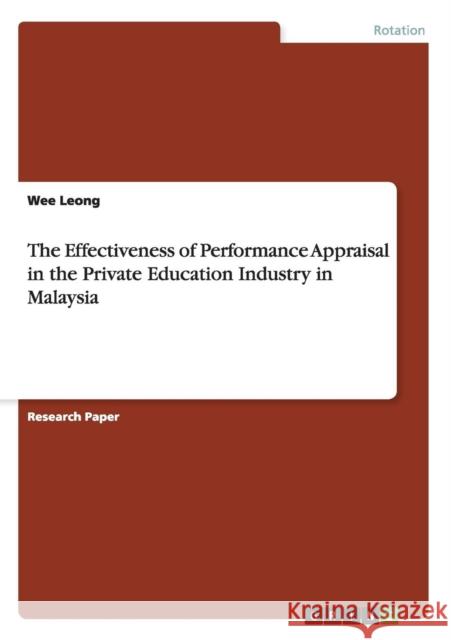The Effectiveness of Performance Appraisal in the Private Education Industry in Malaysia » książka
The Effectiveness of Performance Appraisal in the Private Education Industry in Malaysia
ISBN-13: 9783656837725 / Angielski / Miękka / 2015 / 32 str.
The Effectiveness of Performance Appraisal in the Private Education Industry in Malaysia
ISBN-13: 9783656837725 / Angielski / Miękka / 2015 / 32 str.
(netto: 151,80 VAT: 5%)
Najniższa cena z 30 dni: 158,52
ok. 16-18 dni roboczych
Bez gwarancji dostawy przed świętami
Darmowa dostawa!
Research Paper (postgraduate) from the year 2013 in the subject Organisation and Administration, course: DBA, language: English, abstract: Employee performance appraisal is one of the most commonly used management tools especially in the United States and it has started being used in Malaysia about a couple of decades ago. As such performance appraisal is also one of the most widely discussed and researched areas in industrial/ organizational psychology (DeNisi, 1997; Murphy & Cleveland, 1995). The purpose of this study was to investigate the factors that contribute or affect the effectiveness of performance appraisal in the private education industry in Malaysia. Specifically, this study focused on the positive influence of these determining factors to the organization and the competitive advantage that the organization can achieve. This study also aimed to determine the factors of concern about the effective implementation of performance appraisal system. An integral part of this research was to develop and empirically test a model of effectiveness of performance appraisal in the context of the private education industry in Malaysia. Based on the concepts of Longenecker's and Fink's (1999) System Perspective and Greenberg's (1986) Organizational Justice Theory, this research used a questionnaire to assess Malaysian private education industry in terms of their cognition and perspective of the effective system design, managerial systems practices and system support toward effectiveness of performance appraisal, as well as to assess their perceived fairness toward achieving an effective performance appraisal system. A questionnaire survey method was used to collect primary data from emails which have been sent out to the participants. The survey yielded 171 usable questionnaires, with a response rate of 36.08 percent. Statistical analysis methods and structural equation modeling with IBM AMOS version 18.0 were used to analyze the data. The research findings r











